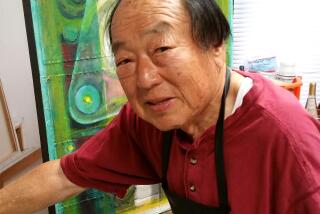Saburo Ienaga, 89; Fought Censorship
- Share via
TOKYO — Saburo Ienaga, a Japanese historian who devoted his life to battling government censorship of Japan’s wartime atrocities in school textbooks, died Sunday, a Japanese news agency reported. He was 89.
Ienaga, a professor at Tokyo University of Education, now Tsukuba University, died at a Tokyo hospital, the Kyodo News agency said. The agency did not cite the cause of death.
The educator began his court battles over textbooks in the mid-1960s and led the movement by teachers and their supporters against Japan’s government textbook screening for nearly four decades.
In his most recent victory, the Japanese Supreme Court ruled in 1997 that the education ministry unconstitutionally blocked mention of Japanese wartime atrocities in Ienaga’s 1983 high school text.
The passages discussed Japan’s deadly experiments on Chinese prisoners.
The ruling was the first time Japan’s highest court had acknowledged a legal limit to the government’s textbook screening.
It also gave a boost to teaching schoolchildren more about Japan’s aggression in Asia in the first half of the 1900s.
Japan is one of the few countries that allows government textbook-screening.
Ienaga lost most of his court battles, and sometimes required police protection from right-wing thugs who believed the historian had disgraced Japan and the emperor.
But many people believe his campaign helped slowly relax censorship of war crimes in textbooks.
Some high school history textbooks now contain vague references to Asian women forced to serve as prostitutes for Japanese soldiers during World War II, and slave laborers who were forcibly brought to Japan from Korea and China to dig tunnels and mines for the Imperial Army.
More to Read
Sign up for Essential California
The most important California stories and recommendations in your inbox every morning.
You may occasionally receive promotional content from the Los Angeles Times.












